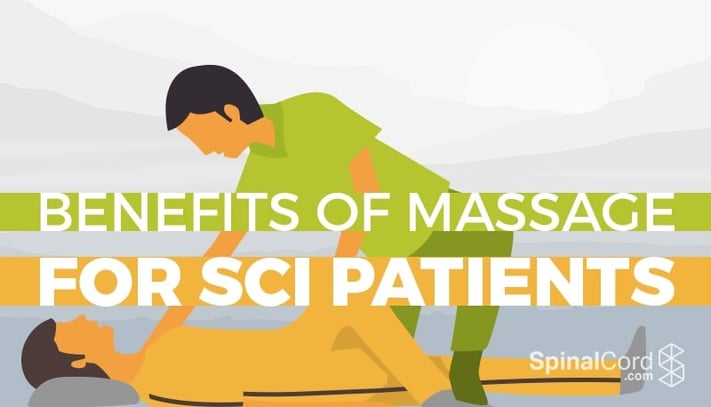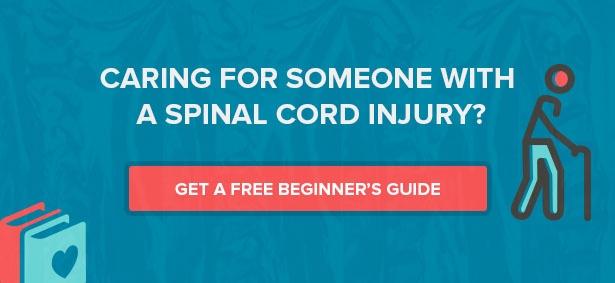Benefits of Massage for SCI Patients

A relaxing room. Soothing music. And the gentle—or firm!--hands of a skilled massage therapist guiding your body steadily into more relaxation. Massage convinces even the most skeptical among us of the power of touch, and can leave you experiencing a massage-induced endorphin rush for hours.
So often, we are encouraged to cut out the things we love—television, lounging around the house all day, sugar, salt—to feel better. It's easy to convince yourself that the things which are good for you are unlikely to feel good. But massage is a rare and precious exception. It does much more than give you a relaxing afternoon and a break from stress. It can offer real healing, so there is no reason to deprive yourself of this highly beneficial indulgence.
Strong Mental Health
A generation or two ago, clinicians treated mental and physical health as entirely separate matters. Doctors focused on getting patients physically better, leaving the issue of emotional well-being to someone else—often a “someone else” who never materialized. Now we know better. Mental and physical health are inextricably linked, especially for people with chronic illnesses and catastrophic injuries.
Strong mental health not only reduces your risk of losing hope about your ability to recover; it can also boost the strength of your immune system and help you keep pushing forward even when physical therapy and other forms of rehabilitation become challenging.
One recent study tested the benefits of massage therapy as compared to exercise. One group of spinal cord injury survivors underwent two forty-minute massages each week for five weeks. The other practiced a new exercise routine twice per week for the same duration. At the end of the study, participants who underwent massage saw a marked reduction in depression and anxiety.
Though exercise also helped, the massage group fared better overall than did the exercise group, suggesting that massage may be even more important than exercise. That's big news, especially in light of research suggesting that exercise can be more effective at treating depression than antidepressants.
Better Muscle Function and Tone
The study that looked at massage's effects on mental health also explored how massage affected muscle function and tone. For spinal cord injury patients, loss of muscle tone and control, spasticity, chronic pain, and overall muscle health are all critical issues. Even if you are paralyzed and can't move your muscles, massage can improve their overall health.
This might seem trivial, especially if you're fighting the uphill battle of tetraplegia. But maintaining strong muscles that are in good health means those muscles will be better equipped to serve you as you regain mobility.
Improved Range of Motion
People with spinal cord injuries often struggle with range of motion issues. Decreased blood flow, a severed spinal cord, swelling, and infections can all inhibit range of motion. But so too can the pain associated with spinal cord injuries. You may be tensing your body without even realizing it, thereby steadily inhibiting the extent to which your muscles can move freely.
Massage therapy helps you regain control of your muscles, boosting range of motion. This improves your prognosis, increasing your odds of regaining some muscle function. It can also help slow the rate of muscle degeneration, and help prevent dangerous injuries. A fall can be catastrophic if you have a limited range of motion, but if you're sufficiently mobile to catch and protect yourself, everything changes. In this regard, improved range of motion really can be a life-saver.
Reduced Pain
Spinal cord injury survivors often struggle with pain. Injuries hurt, of course, but for many SCI survivors, it's not their injuries, but the subsequent sedentary lifestyle that is the problem. If your mobility is compromised, exercise becomes more difficult. Over time, as you exercise less and less, exercise can become painful, creating a vicious cycle that keeps you away from exercise and trapped in chronic pain.
Massage helps break up the muscle knots that come with both injuries and a sedentary lifestyle. By improving emotional well-being, massage can also alter your perception of your pain, making it feel more manageable and less overwhelming. Dozens of studies have documented the role of massage therapy in pain reduction, so even if this is your sole reason for seeking a massage, your efforts will not be wasted.
Improved Circulation
People with spinal cord injuries commonly struggle with poor circulation. A number of factors contribute to this phenomenon. If you are wheelchair-bound and can't walk, then blood flow to your feet and legs decreases. Your injuries may also compress arteries and veins, further restricting circulation. And if you are unable—or unwilling—to get lots of exercise, your circulation is further reduced.
You probably already know that poor circulation reduces muscle tone and can cause your extremities to “fall asleep” or feel tingly. But poor circulation can also kill you. When blood can't circulate properly, dangerous blood clots can develop. If these blood clots break loose, they can kill you. Poor circulation also contributes to chronic muscle pain, and can slow your ability to heal from both minor and major injuries.
Massage increases blood flow both to the muscles massaged and to surrounding areas. By improving muscle tone and function, it can also help your body maintain healthy circulation long after your massage session is over. And this is an easy claim to test. If your muscles experience less tingling and numbness after a massage session, then you can be certain you're making progress.
Increased Self-Efficacy
Self-efficacy is a measure of your confidence in your ability to care for yourself and advocate your needs. The concept, originally developed by developmental psychologist Albert Bandura, is correlated with better mental health, greater educational and career success, and an increased sense of independence. Though researchers aren't sure why, regular massage is correlated with an increase in self-efficacy and self-care skills.
For spinal cord injury survivors struggling with self-esteem issues, overwhelmed by intrusive but well-meaning loved ones, or frustrated by an inability to care for themselves, then, massage therapy can be a life-changing treatment option.
Stay Updated on Advancements On Traumatic Brain &
Spinal Cord Injuries
About the Author





